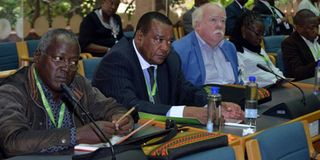Green Revolution Forum confronts food, fertilizer crises

Delegates follow proceedings at the 6th African Green Revolution Forum in Nairobi in 2016.
As government officials, corporate leaders, and international donors prepare to travel to Kigali, Rwanda for the first in-person African Green Revolution Forum in three years, they will be face-to-face not only with one another but with a fundamental challenge to their core mission.
Inorganic fertilisers, the hoped-for catalyst of a productivity revolution, have had supplies disrupted by the Russia-Ukraine war, and prices have doubled, tripled, or even more. This has made fertilisers less affordable for governments, many of which heavily subsidize their purchase, and for farmers, many of whom have become heavily dependent on the imported input.
In the short run, the fertiliser crisis exacerbates a food crisis already advanced by Covid-19, conflict, and climate change. The United Nations estimates that 346 million people in Sub-Saharan Africa are suffering from severe food insecurity. The U.N. World Food Program estimates that fertiliser shortages will cause a 14 per cent drop in cereal production and could push 7 million more into food insecurity.
In the long run, though, the crisis challenges the Green Revolution model itself, pushing farmers and governments to reduce their dependence on this expensive fossil-fuel-based input, which most countries import.
Commercial seeds
That is precisely what African civil society, farm, and faith leaders have been demanding for years, saying the Green Revolution approach is “doing more harm than good.” They raised that demand before last year’s Green Revolution Forum, delivering a letter signed by more than 200 organizations that called on AGRA’s donors to cease funding the initiative.
They had evidence on their side, and since then more has been produced. Earlier studies had shown that the Green Revolution package of commercial seeds and fertilizers was failing to significantly raise productivity, incomes, or food security for 30 million smallholder families, as promised by AGRA and its donors. Crop diversity had declined with the heavy promotion of maize and rice, and diet diversity worsened as a result. The number of chronically hungry people in AGRA’s 13 focus countries increased by 31 per cent rather than being cut in half. Overall, 50% more Africans are hungry now than in 2006 when the Bill and Melinda Gates Foundation and the Rockefeller Foundation launched AGRA.
In February, a Gates Foundation-commissioned evaluation of AGRA’s last five years confirmed these poor farmer outcomes. Yields grew slowly, incomes barely rose, and food insecurity remained endemic in rural areas. In addition, the evaluation found that environmental impacts were negative and the main beneficiaries were not women smallholders but wealthier male farmers.
Donors have thus far ignored the findings of their own evaluation. The U.S. Agency for International Development, one of AGRA’s core funders, quickly dismissed the critical findings, stating, “We appreciate AGRA’s response to the report conclusions and concur with their proposed next steps to improve performance outcomes.” After a March 30 briefing for members of U.S. Congress by African civil society leaders, three representatives wrote a letter to their colleagues calling on them to reconsider funding for AGRA and to demand greater accountability for its poor performance.
That is what African civil society leaders will demand at a September 1 virtual press conference. Some of the same leaders, many affiliated with the Alliance for Food Sovereignty in Africa, will chastise AGRA donors for their inaction and “call for an end to the failing Green Revolution,” charging that it “has deepened the continent’s dependence on costly imported inputs and undermined the resilience of Africa’s food systems.”
Ignoring this imperative, African governments are mostly doubling down on fossil fuels and fertilizers. Dr. Akinwumi Adesina, president of the African Development Bank, recently announced a $1.5 billion African Emergency Food Production Facility to help governments buy more high-priced fertilizer, promising it would drive “structural changes in agriculture.” According to Dr. Adesina, “If we don’t solve the fertiliser problem, we cannot solve the food problem,”
Fossil fuel
For the sovereignty alliance’s diverse continent-wide network, the fertilizer problem won’t be solved by deepening Africa’s dependence on unsustainable fossil fuel inputs. It has long called for a more profound structural change, demanding a shift in donor and government support away from import-dependent industrialized farming, which some refer to as “climate-stupid agriculture.”
Today’s food and fertilizer crises highlight the urgency of that shift. Grassroots organisations are not waiting for donors and governments to act. Some Alliance members are now producing organic fertilizers made from locally sourced materials in “bioinput centers” across Africa. Many would welcome government and donor support to scale up such initiatives.
When you find yourself in a hole, the adage says, stop digging. Instead of responding to the fertiliser crisis by digging a hole so deep African farmers can’t get out, it is time for Green Revolution promoters to put down their shovels and admit that the climate-constrained future has overtaken them. The shovels could be very useful in the production of organic fertilizers made from local materials.
Timothy A. Wise is a senior advisor at the Institute for Agriculture and Trade Policy and a Research Fellow at Tufts University. He is the author of a 2020 assessment of AGRA.




